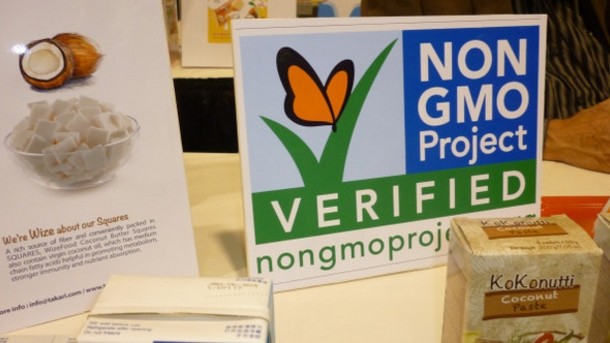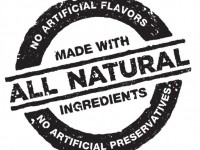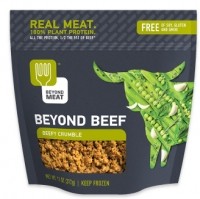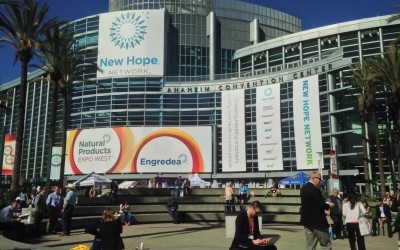Mintel GNPD data: 15.7% of new US food/bev products made non-GMO claims in 2015 vs 2.8% in 2012

Using data from its Global New Products Database (GNPD), which tracks new product launches, Mintel has been measuring the percentage of new products making scores of label claims spanning everything from gluten-free to prebiotics over several years.
According to new data shared with FoodNavigator-USA, 13.5% of new products launched in the US food retail market in 2015 made organic claims, compared with 10.7% in 2014.
However, the biggest growth was in non-GMO claims, with 15.7% of new products making Non-GMO/GMO-free claims in 2015 vs 10.2% in 2014 and just 2.8% back in 2012.
13.5% of new products made organic claims in 2015
Other big risers included allergen-friendly claims (up from 23.3% of new launches in 2014 to 26.4% in 2015; and vegan claims (up from 5.1% of new launches in 2014 to 7.2% in 2015).
13.5% of new products launched in the US food retail market in 2015 made organic claims, compared with 10.7% in 2014, and 6.4% in 2012.
Small drop in percentage of new products making natural claims
There was, however, a small drop in the percentage of new launches featuring 'natural' claims, a trend which seemed to peak in 2013, with 13.8% of new products featuring the claim, but dropped to 12.6% in 2014 and 11% in 2015, said Mintel's director, innovation & insight, Lynn Dornblaser.
This was likely due to multiple factors, from the threat of being slapped with a class action lawsuit, to the rise in organics (seen as a stronger claim), to the fact that some firms feel there are other ways to indicate naturalness (shorter ingredients list, clean labels, packaging design) beyond stating it on pack, and in part because claims are getting more specific, she said.
"The trend we've seen is that of products promoting the specifics of what is or is not in a product (no additives, no artificial colors, etc.), rather than just slapping on the "all natural" claim. I would expect that to continue."
Natural claims on a slight downward trend
There has been a small drop in the percentage of new launches featuring 'natural' claims, a trend which seemed to peak in 2013, with 13.8% of new products featuring the claim, but dropped to 12.6% in 2014 and 11% in 2015.
Low sugar, low fat, claims
The data also shows a slight rise in low sugar claims and a slight decline in low fat claims, although it's not statistically significant, added Dornblaser: "We see a certain amount of variation from year to year, so I don't put too much importance on this. However, it is the case that we see more activity in products with full fat (think of the growth of full fat yogurts), and a few more products talking about low sugar."
The rise in vegan claims is noteworthy, however, she said:
"I think vegetarian claims on products have gone the same way that 'diabetic' ones have, that is, if you want to buy these things, you don't really need the claim to tell you that the product is suitable, you're going to look at the ingredient statement...
"But with vegan, given that the trend is relatively new, and that it is difficult to do, we see companies providing a shortcut for consumers by labelling products as vegan when they are."
The number of launches flagging up social media-related things on front of pack has also surged in recent years, up from 4% in 2012 to 16.7% in 2015.
Claims on the rise 2009-2015 (% of new products in the USA making the following claims)
- Kosher: 2015 (43.3%),2014 (40.6%), 2013 (36.3%), 2012 (26.8%), 2011 (27.4%), 2010 (29.3%), 2009 (26.6%)
- Allergen claims (dairy-free, soy-free, etc):2015 (28.6%), 2014 (24.7%), 2013 (18.7%), 2012 (11.1%), 2011 (10.9%), 2010 (10.4%), 2009 (8.5%)
- Ethical/environmentally-friendly packaging: 2015 (24.7), 2014 (21.8%), 2013 (20.3%), 2012 (14.4%), 2011 (13.7%), 2010 (13.6%), 2009 (8.5%)
- No additives/preservatives: 2015 (20.2), 2014 (18.2%), 2013 (17.3%), 2012 (12.5%), 2011 (13%), 2010 (14%), 2009 (13.2%)
- Gluten-free: 2015 (26.4%), 2014 (23.6%), 2013 (13.8%), 2012 (11.9%), 2011 (13.1%), 2010 (13.9%), 2009 (12.1%)
- Non-GMO/GMO-free:2015 (15.7%), 2014 (10.2%), 2013 (6.5%), 2012 (2.8%), 2011 (2.7%), 2010 (1.6%), 2009 (1.9%)
- Ethical/environmentally-friendly product: 2015 (7.9%), 2014 (6.6%), 2013 (5.8%), 2012 (2.3%), 2011 (2.4%), 2010 (2.1%), 2009 (2.6%)
- Social media claims: 2015 (16.7%), 2014 (13.3%), 2013 (10.1%), 2012 (4%)
Mintel’s data also correlates with an analysis released this week by Gladson,* a leading provider of digital product content and related services for the consumer goods industry, which showed a 61% increase in products labeled as gluten-free, a 77% rise in products labeled organic, and a 43% rise in products featuring allergen-related claims between 2013 and 2015.
*The Gladson e-commerce database features 600,000+ items.










